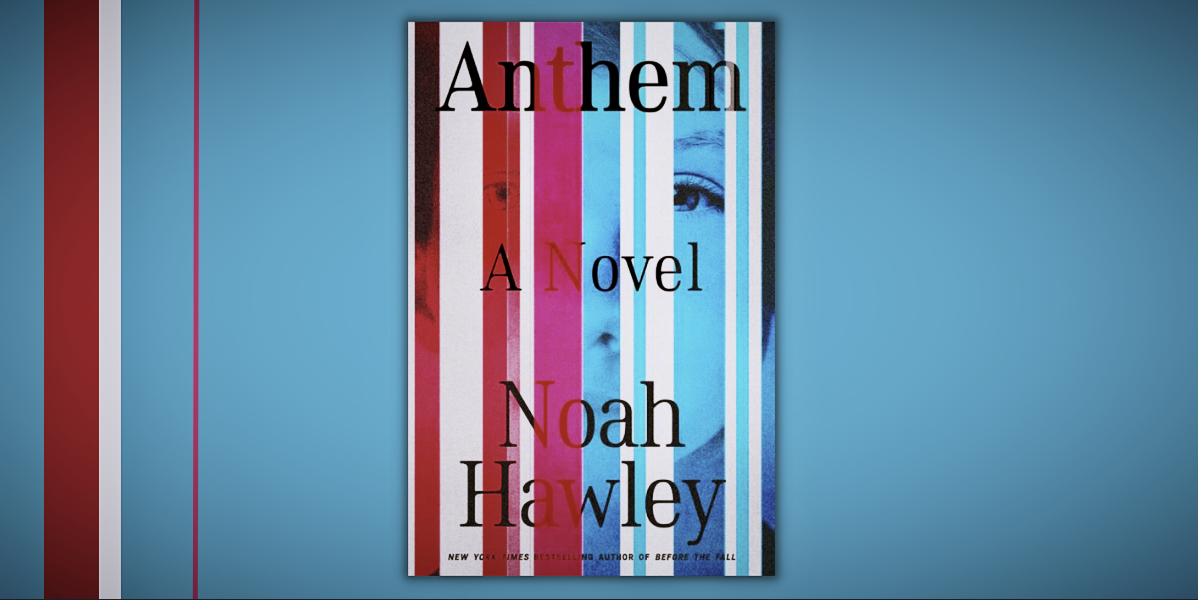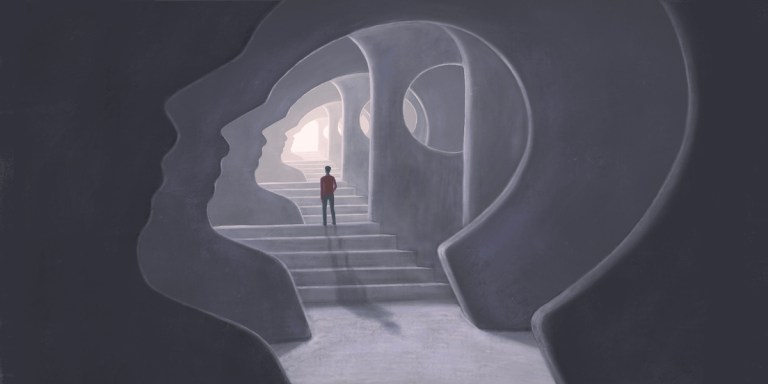Read the Excerpt: Anthem by Noah Hawley
 The lights flash, signaling the event is about to get underway. People move to take their seats. A group of unvaccinated 3rd graders clamor down the aisle to join their renegade families. They are biologically unprepared for mumps or measles, chicken pox or rubella, but anecdotally free from the whispered threat of autism.
The lights flash, signaling the event is about to get underway. People move to take their seats. A group of unvaccinated 3rd graders clamor down the aisle to join their renegade families. They are biologically unprepared for mumps or measles, chicken pox or rubella, but anecdotally free from the whispered threat of autism.
Everybody has a theory, Judge Nadir has come to believe. A conviction, dogged and tenacious, which they refuse to surrender. This is the American way. We have home remedies we swear by, superstitions we will not renounce. We are optimists or pessimists, trusting or suspicious. We confirm out theories online. The internet, invented to “democratize information,” has turned out, instead, to be a tool of self-affirmation. Whether you believe you’re suffering from chronic fatigue syndrome or that 9-11 was an inside job, the world wide web exists to tell you you’re right.
You are always right.
It is making the laws harder to enforce, Margot has noticed. Lately she has found an increasing number of defendants who refuse even to recognize the authority of the court. They talk about the 14th amendment, about the facade of the federal government. What qualifies judges and lawyers to say what’s legal and illegal, what’s right and wrong? Like some kind of Kafka meets Abbott and Costello routine. Every American, they write in their self-defended briefs, is an institution, a judge capable of deciding for themselves what path to follow, what truth to believe.
Which, while existentially true, is not how society works. And certainly not how the American judicial system — with its tiers of law enforcement, lawyers, judges, prisons and parole officers — was designed to function.
The curtain opens. Miss Cindy comes out on stage, smiling nervously. She thanks them for coming and shills the bake-sale upcoming.
“Just a reminder,” she says, “that there’s no school next Thursday or Friday for parent-teacher conferences.”
A collective groan rises from the crowd — the involuntary sound of adults who have neglected something critical, in this case scheduling childcare for unprotected workdays. Before Miss Cindy’s even finished, smart phones have appeared, screens lighting up, messages of desperation sent into the void.
“And now please welcome Story Burr-Nadir.”
And then Miss Cindy is gone and young Story steps out onto the stage.
There she stands, willowy and blond, with her impossible blue eyes and effortless human grace. Looking at her, Margot realizes she’s holding her breath. A 9-year-old girl is a weightless butterfly — hair brushed imperfectly, adult teeth still too big for the mouth — and yet possessing a rare, fleeting beauty, like a newborn colt, legs comically long, but walking immediately, miraculously. So many critical systems are still forming for girls of this age, the paper-thin wings of their identity. Story is on the small side, just eyes and a smile. She is a hater of dresses, freckles beginning to emerge from beneath the down of her skin. Her blonde hair will turn brown one day, surrendering to genetics, but for now she wears a golden mane, her bangs blunt cut with construction scissors to a length (short) that still makes her mother cringe.
She steps into the light. It’s clear from the microphone and piano accompaniment that she will be singing, but the song isn’t listed in the program. Nor, Margot realizes, does she know exactly what her daughter has chosen. There was talk of a recent pop ballad, then talk of an old folk number, but in all the hurry of the day-to-day, mother and daughter disconnected on this one critical issue. Like a Halloween costume unmade.
And yet here she is, about to sing.
Watching her, Margot experiences a moment of dislocation, a sudden vertigo of distance, as if her 9-year-old daughter has unexpectedly become a stranger — an individual with a mind of her own, a life of her own (her own theories). And then the accompanist plays middle C and Story begins to sing.
“Oh say can you see, by the dawn’s early light?”
Silence. And then — like a wildfire — as it becomes clear that Story Burr-Nadir is, in fact, singing the national anthem, parents spring to their feet. Military veterans and sports fans first, but the ascension spreads — most rising with legitimate patriotism, but some from a sense of obligation. Some even with resentment — I just sat down. Others with irony — patriotism is so Midwestern.
“— what so proudly we hailed, at the twilight’s last gleaming.”
Judge Nadir stands as if lifted. She stands the way the hair on the back of her neck stands, raised by a sudden wind of superstition — superstition in its purest, old-testament form, a hallowed wave of rightness. As if this moment — in which her daughter has decided to give voice to the war-torn hopes of a new nation — combined with the surprise of hearing her sing it for the first time, has created a synchronicity of deep spiritual meaning. It is not a voluntary feeling. Not an intellectual choice. The judge spends her days sitting on a dais before an American flag. She herself is an American institution — her Honor — steeped in the power and history of symbols.
“— whose broad stars and bright stripes —”
Later, they will eat ice cream on the promenade and watch construction crews on the night shift prepare the waterfront for the parks to come. They will laugh about Clive and his overweight Michael Jackson impersonation, and wasn’t Hannah’s voice pretty. Remy will reenact the way Malcolm kept pulling up his pants, as he bounces Hadrian in his arms. It is the first warm night of April. Families from all over the neighborhood are out on the streets. The traffic on the BQE has quieted. They eat mint chocolate chip and raspberry sorbet with rainbow sprinkles. Margot can’t stop talking about how proud she is, how surprised she was.
“Did you see everybody standing?” she says.
“They had to stand, mom,” says Story. “It’s the national anthem.”
Margot meets her husband’s eye and smiles. He smiles back, feeling both restless and content. Content because the idea of America when absorbed through imagery or idealistic song, brings an almost overwhelming sense of identity, of belonging. A swell of national wonder. And restless because feelings are not facts, and the desire to belong, to be something, doesn’t make that dream come true.
Hope.
From the promenade they can see the Statue of Liberty and the Empire State Building. They can see kids on scooters and kids on bikes. They can hear the happiness of boys on swings, vaulting up into the twilight, their feet kicking — higher, higher. It is the hour after dinner when all the nannies have gone home for the night, when families cleave together with the illusion of permanence. A parent will always be a parent. A child will always be a child. Like a warm breeze that brings with it the feeling that happiness is a temperature.
Everything is all right. Mommy’s here.
You don’t have to worry. Daddy’s got you.
As if time itself wasn’t devouring every second, propelling the young towards old age and the elderly towards death. As if the parents themselves weren’t once children, clinging to their own parents’ legs. And their parents weren’t toddlers themselves a few decades before. As if any moment could last forever, caught in mid-air, like a single note trembling without beginning or end, like
the home of the —
brave.
Order the Book
Something is happening to teenagers across America, spreading through memes only they can parse.
At the Float Anxiety Abatement Center, in a suburb of Chicago, Simon Oliver is trying to recover from his sister’s tragic passing. He breaks out to join a woman named Louise and a man called The Prophet on a quest as urgent as it is enigmatic. Who lies at the end of the road? A man known as The Wizard, whose past encounter with Louise sparked her own collapse. Their quest becomes a rescue mission when they join up with a man whose sister is being held captive by the Wizard, impregnated and imprisoned in a tower.
Noah Hawley’s new novel is an adventure that finds unquenchable lights in dark corners. Unforgettably vivid characters and a plot as fast and bright as pop cinema blend in a Vonnegutian story that is as timeless as a Grimm’s fairy tale. It is a leap into the idiosyncratic pulse of the American heart, written with the bravado, literary power, and feverish foresight that have made Hawley one of our most essential writers.
By clicking 'Sign Up,' I acknowledge that I have read and agree to Hachette Book Group’s Privacy Policy and Terms of Use






